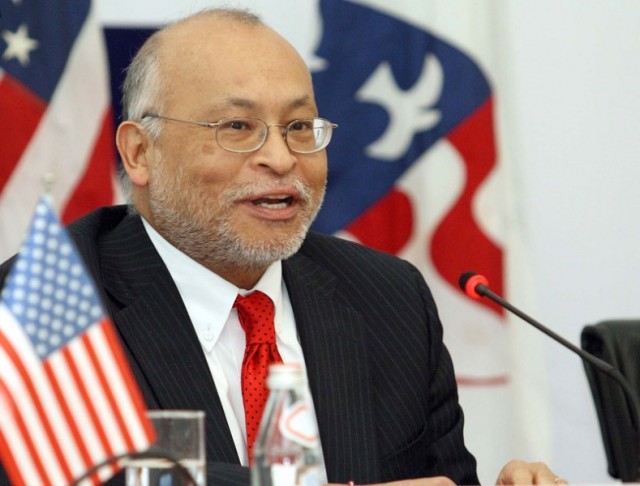By Alexander A. Arvizu, U.S. Ambassador to Albania
Albania celebrated its 100th anniversary in November. It was a time to be proud, a time for reflection on the country’s success in overcoming great turmoil to become a NATO member and EU aspirant. Now, as Albanians look forward to the June 23 Parliamentary elections, we stand at the beginning of a new chapter in Albania’s history — one that should be defined by flourishing democracy indisputably built upon the will of the people. Traveling around Albania, I find common themes in my conversations, regardless if it is in Shkodra or Gjirokastra, Vlora or Elbasan. Albanians are worried about real issues — employment, providing for their families, health care, education, environmental degradation, and crime to name a few. Many have complained to me that the political leadership (and here let me be clear respondents speak of both the ruling coalition as well as the opposition) seems solely focused on personal or party interests rather than on solving these widespread problems. As Albanians prepare to embark on this new chapter, one element of change seems to rise above all others in terms of importance: the way elections are conducted in Albania, specifically the need to shift focus on the people, with government institutions and political parties serving the people’s interests.
When Secretary Clinton addressed parliament, she made one clear plea to elected officials in the audience to ensure that the upcoming elections are free and fair, and seen as such by the world, so that the people of Albania can have faith in the results and democratic institutions, and trust in their leaders. Democracy is not a concrete bunker that isolates the political leadership from the people. On the contrary, elected officials have the obligation to serve in a responsible manner and to use their positions of power to benefit all citizens. Leaders must earn the people’s trust through a transparent, free and fair process. Furthermore, political parties’ behavior directly impacts the public’s confidence in the election. As Albania’s most steadfast and enduring international friend and partner over the years, the United States calls on the government and all political parties to focus on strengthening the public’s faith in the electoral process and trust in their leaders.
Let me state a simple, painful truth: public faith in the electoral process is low. Consequently, so is ours. In a strong democracy, the government and political parties have a responsibility — make than an obligation — to earn the trust of the people. They can do this by cooperating within electoral institutions, by deliberating avoiding political trickery, and by abstaining from destructive and inflammatory language in public rallies or party literature. Messages that threaten other individuals or incite violence in any form will only erode the confidence that candidates and parties are willing to work together. The legitimacy of any government resulting from the next election will depend on how the parties behave during the coming months.
The government has the solemn obligation to act accountably, transparently, and impartially. This is a key tenant in the Copenhagen criteria, which defines whether a country is eligible to join the European Union. Furthermore, the government must be inclusive and nonpartisan in the institutional decision making. The ruling party has the responsibility to encourage trust by actively seeking consensus through compromise and dialogue. No less important, the opposition must commit to participating constructively in the process, and avoid threats to block or to boycott. Everyone is responsible for cooperating fully with law enforcement and other agencies to promote the security and integrity of the electoral process.
When I think about Secretary Clinton’s speech, one particular passage stands out. She explained that people frequently ask her how she could work with President Obama after having fought so hard against each other in the 2008 Presidential campaign. “It’s a very simple answer,” she said, “we both love our country.” Love for country means putting national interests above party interests. It means doing everything possible to keep partisan politics out of electoral institutions. Love for country means voting freely and responsibly. Love for country is borne of actions, not words, with an eye toward the next 100 years of nation building. With June 23 soon approaching, I call on all Albanians to start a new chapter with these elections, to put aside individual and party interests, to insist on accountability from the political class. More than anything, I appeal to you to accept individual responsibility for making this happen. For only individual Albanians putting Albania’s interests first can build the just, democratic society that will make present and future generations of Albanians justifiably proud. And make Albania the country you love.
